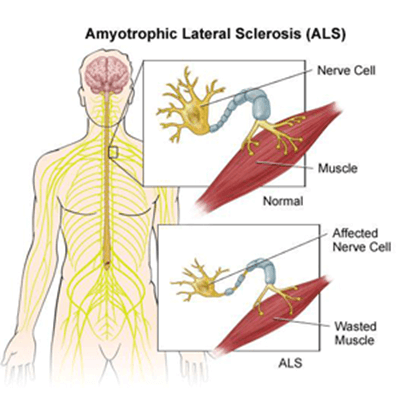What is the full form of ALSALS: Amyotrophic Lateral SclerosisALS stands for Amyotrophic Lateral Sclerosis. It is a neurodegenerative disease that affects motor nerve cells in the brain and spinal cord. It is a progressive disease as it gets worse over time and causes the death of motor nerve cells (neurons) that control the voluntary muscles. Eventually, the motor nerve cells can no longer send impulses/signals to muscles and muscles begin to waste away or decrease in size (atrophy). It affects the ability of the brain to initiate and coordinate muscle movement and the person may not speak, eat, move and breathe properly. 
ALS is also known as motor neuron disease (MND). The word "Amyotrophic" is derived from the Greek language. It is a combination of three words, "A" means no. "Myo" means muscle and "Trophic" means nourishment, so it means no muscle nourishment. ALS is discovered by a French neurologist Jean-Martin Charcot in 1869. It is also called Lou Gehrig's disease after the famous baseball player was diagnosed with this medical condition. ALS can be of two types, sporadic and familial. Sporadic is the most common type of ALS in the U.S. Familial, as the name suggests, is a hereditary disease as it passes from one generation to the next generation. Common SymptomsThe symptoms of ALS may vary from person to person. Some of the common early symptoms are as follows:
Before affecting other parts of the body, ALS typically starts in the hands, feet, or limbs. Your muscles become progressively weaker as the disease worsens and more nerve cells are lost. This eventually has an impact on breathing, speaking, chewing, and swallowing. In the early stages of ALS, there is typically little discomfort, and pain is rare in the later stages. Typically, ALS does not impair your senses or bladder control. CausesALS affects the nerve cells that control voluntary muscle movements like walking and talking (motor neurons). The motor neurons steadily degrade and eventually die as a result of ALS. The brain, spinal cord, and all the muscles in the body are connected by motor neurons. Motor neurons that have suffered damage stop communicating with the muscles, which prevents the muscles from working. In 5% to 10% of cases, ALS is hereditary. The reason for the remaining cases is still unknown. Researchers are still looking at potential ALS causes. The majority of ideas focus on the intricate interplay between hereditary and environmental influences. Risk ComponentsThe following are recognised ALS risk factors:
The following environmental factors could cause ALS:
Next TopicFull Form
|
 For Videos Join Our Youtube Channel: Join Now
For Videos Join Our Youtube Channel: Join Now
Feedback
- Send your Feedback to [email protected]
Help Others, Please Share










